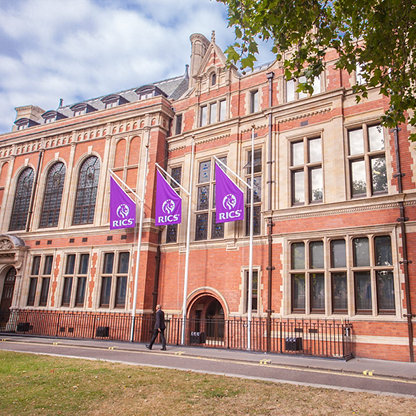We are the Royal Institution of Chartered Surveyors (RICS), a leading professional body working in the public interest to advance knowledge, uphold standards, and inspire current and future professionals. Our members help to create and protect built and natural environments that are sustainable, resilient and inclusive for all.
At RICS our staff work inclusively with our members, collaborating to support them in their practice and build connections. We set qualifications and independently regulate chartered professionals and firms, building trust and confidence with clients and consumers.
With a heritage of over 150 years, RICS sets the standard for over 130,000 members and candidates operating in the development and management of land, real estate, construction and infrastructure across more than 140 countries globally.
Our trusted data and insight guides decision makers and governments helping to shape public policy, deliver positive societal change and provide a foundation for confident markets. Our members influence the quality of lives, underpin societies and drive economies. Everything we do supports our current and future membership to uphold, advance and inspire professionalism for the benefit of society.
Find out more about what we do:
RICS annual review 2024
A year of transformation for RICS. Read on to find out how we’re shaping an experience-led, member-centric organisation, driving positive change.

Our strategy – Future Foundations
Our strategy for a built and natural environment that is sustainable, resilient, and inclusive for all.

Future Foundations
Supporting our vision for a natural and built environment that is sustainable, resilient, and inclusive for all, Future Foundations sets out the strategy and goals that we will prioritise for the next three years. To launch this, we asked members and colleagues to tell us what RICS means to them.
History
We can trace our history right back to 1792
The Surveyors Club was formed as far back as 1792. However, the foundations of the current organisation started to properly take shape when 20 surveyors met at the Westminster Palace Hotel.
Under the chairmanship of John Clutton, they appointed a sub-committee to draw up resolutions, bye-laws and regulations. This was done in order to establish a professional association to represent surveyors and the growing property profession.
The Institution of Surveyors
This group, which had expanded to 49 members by 1868, met again at the Westminster Palace Hotel on 15 June 1868 to approve the resolutions and elect the first Council. John Clutton was elected the first president of the Institution of Surveyors. Offices were then leased at 12 Great George Street , which we still use as our headquarters today.
The requirement for such an organisation was driven by the rapid development and expansion of the industrialised world; as infrastructure, housing and transport links grew, so did the need for more stringent checks and balances.
Safeguarding the future
For more than 140 years, our professionals have worked to ensure that, while unlocking the inherent value held within the world's physical assets and developing its potential, we don't spoil the planet for future generations.
Even in parts of the world where the term 'chartered surveyor' means very little, the high standards of our professionals speak volumes. They are viewed by major financial institutions and world governments as the 'gold standard' when it comes to professional regulation in the property sector.
Royal Charter and Bye-Laws
We're incorporated by Royal Charter, which sets out our objectives
Our Royal Charter requires us to promote the usefulness of the profession for the advantage of the UK public and in other parts of the world. In practice, the charter means that important changes to our constitution – its bye-laws – have to be ratified by the UK Government, through the Privy Council, even after they’ve been approved by a majority of our members voting at a general meeting.
The continued demand for royal charters, which may seem an antiquated concept, shows that they retain their cachet in the modern professional world as a “gold standard” of excellence and integrity.
For more information on our governance structure, including our Royal Charter and Bye-Laws, please visit our Corporate Governance page.
Acceptable Behaviour Policy
At RICS we aim to provide excellent standards of service, in line with the RICS values statement, to all who communicate and interact with us. We work hard to deliver these standards, and to treat service users with respect and dignity. Equally, we have a reasonable expectation to be treated with respect by those who communicate with us. This policy sets out how we manage those small number of instances of unreasonable behaviour that arise during our work. It applies to members of the public or members who have raised concerns with us, as well as the firms and individuals we regulate.
For further information, please see “RICS – Acceptable behaviour policy''.







